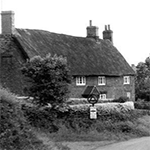At the bottom of our big field at Butterwell farm in Byfield was a stream. For a small boy the bank on the other side, that led up to a metal fence and onto the Daventry Road, seemed very steep and since it was lined with nettles I regarded the stream as the border of our lands.
In the summer it trickled gently on from Mr Peter Thompson's field and open country beyond, at one end through our field and on to a neat, wire mesh lined, hole in a brick wall which separated the bottom part of our land from a small house where an old man lived. In the winter the stream became a bit of a torrent, often more than a yard and a half wide. One year it flooded almost all the way up the slope of the field and must have been thirty yards wide.
There were no fish in the our stream for it was too shallow and in parts it was often just a muddy trickle. But there were all sorts of grubs and insects which lured in an inquisitive young boy so ensuring that he would head back home sufficiently wet and dirty to annoy both of his parents.
My father told us that if we spat in the stream our spit would end up in London. And that was true because somewhere along the line, nearer to Banbury, the stream flowed into the Cherwell which, at Oxford, flows into the Thames. Naturally this was an invitation to send my piss to London as well. Even at a young age having only visited the Capital twice, I knew what I thought of folks in the big smoke and so had to send them a sign of my contempt.
Though I pestered many of our neighbours, I cannot remember speaking much to the old man on the other side of the brick wall. He did not seem to want to talk to anyone.
I knew that he had fought in the war and spent rather too long in a German Prisoner of War camp. And I knew about his goldfish and that was that. Every now and again the old man would go to Banbury and come back with goldfish. These he would then release into the stream and they would swim away from our his house towards the church at the other end of the village.
How far did they get? I guess we will never know. I suspect goldfish would rather have been in warmer waters. And they will have found parts of the stream very shallow indeed and may well have got stuck. One thinks of the little blighters stranded in summer as the stream dried up and dying an unpleasant death. And of course there would have been predators galore. Even where we fished in the upper reaches of the Cherwell there were pike and perch which would have thought a goldfish was a rare treat.
Rather like the prisoners on the Great Escape one imagines that very few of the old man's goldfish made it very far, Maybe there was the odd Charles Bronson who finally made it to freedom in the Thames at Oxford. Somehow I doubt it. Surely the old man must have known that the fish he released would almost all enjoy an all too brief freedom? But perhaps he viewed that as a better way to go than cooped up in a small Stalag goldfish bowl or aquarium or sent to perish in plastic bags at the fair.
Years later I stayed at a kibbutz at Ein Gedi near the Dead Sea in Israel. At one table there were a group of elderly ladies who were all very fat. All ensured that their plates were as full as possible and they ate in an almost compulsive manner, gobbling fast as if it were a race, as if there was an external pressure on them. And of course there was. Each had a telephone number tattooed on their arm. It must have been 55 years since they were liberated from the death camps but those ladies were never really free. Our neighbour in Byfield had been free for just thirty years but the war was not over for him.
As a boy so many in the village in which I lived were touched first hand by the second world war. Fifty years later my son will probably never meet anyone with first hand experience of that great conflict.


